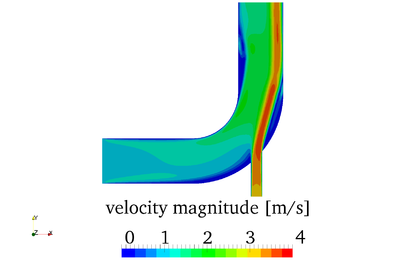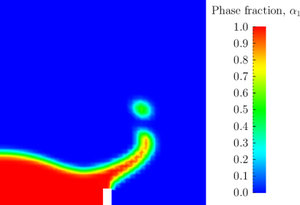Difference between revisions of ""first glimpse" series"
Jozsef Nagy (talk | contribs) |
Jozsef Nagy (talk | contribs) |
||
| Line 9: | Line 9: | ||
=[https://wiki.openfoam.com/index.php?title=First_simulation_by_Jozsef_Nagy First simulation - Flow in an elbow]= | =[https://wiki.openfoam.com/index.php?title=First_simulation_by_Jozsef_Nagy First simulation - Flow in an elbow]= | ||
| − | [[File:Elbow.png| | + | [[File:Elbow.png|400px|right|velocity magnitude of the elbow case at t=75s]] |
In this tutorial you will get a first hands-on glimpse into the workflow of CFD simulations with OpenFOAM. The following topics will be covered: | In this tutorial you will get a first hands-on glimpse into the workflow of CFD simulations with OpenFOAM. The following topics will be covered: | ||
| Line 19: | Line 19: | ||
* simulation (2D elbow case with three meshes) | * simulation (2D elbow case with three meshes) | ||
* postprocessing | * postprocessing | ||
| + | |||
| + | |||
| + | |||
| + | |||
| + | |||
| + | |||
=[http:// openfoam.com/documentation/tutorial-guide/tutorialse7.php#x12-650003.1 Second simulation - Liquid-gas interaction]= | =[http:// openfoam.com/documentation/tutorial-guide/tutorialse7.php#x12-650003.1 Second simulation - Liquid-gas interaction]= | ||
| Line 24: | Line 30: | ||
In this second tutorial you will learn about the liquid-gas interaction in a multiphase flow. Here you will simulation a transient flow of two fluids separated by a sharp interface, or free surface. The focus here is on: | In this second tutorial you will learn about the liquid-gas interaction in a multiphase flow. Here you will simulation a transient flow of two fluids separated by a sharp interface, or free surface. The focus here is on: | ||
| − | * mesh generation | + | * mesh generation |
| − | * boundary conditions | + | * boundary conditions [[File:alpha_opencfd.png|300px|right|liquid and gas distribution]] |
* initial fields | * initial fields | ||
* fluid properties | * fluid properties | ||
Revision as of 08:52, 26 September 2016
Go back to Tutorials.
Contents
Installing OpenFOAM
In order to be able to complete the tutorials, you will have to install OpenFOAM. There are multiple ways to do this. First, follow the official guideline [http:// www.openfoam.com/download/installation.php here].
Alternatively, you can follow the video tutorial of Jozsef Nagy or the written tutorial of Joel Guerrero.
First simulation - Flow in an elbow
In this tutorial you will get a first hands-on glimpse into the workflow of CFD simulations with OpenFOAM. The following topics will be covered:
- basic case setup
- initial values
- boundary conditions
- mesh
- simulation (2D elbow case with three meshes)
- postprocessing
[http:// openfoam.com/documentation/tutorial-guide/tutorialse7.php#x12-650003.1 Second simulation - Liquid-gas interaction]
In this second tutorial you will learn about the liquid-gas interaction in a multiphase flow. Here you will simulation a transient flow of two fluids separated by a sharp interface, or free surface. The focus here is on:
- mesh generation
- boundary conditions
- initial fields
- fluid properties
- time step control
- discretisation schemes
- solver control
- running the simulation
- postprocessing
Third simulation - Vortex shedding
This is a more advanced simulation, where you can get a first idea, how to model the complex fluid dynamic phenomenon of vertex shedding behind a square cylinder. Find the pdf and the case files here.
- Click on the link to the pdf
- On slides 54-65 you will find a short description of the problem
- Download the case from the link provided
- Extract the file
- Open a terminal by pressung ctrl+alt+t
- If you extracted the file e.g. in Downloads change your working directory to the simulation case by entering into the terminal
cd Downloads/30x/advanced_physics/turbulence/squarecil/les
- Follow the commands on slide 76 of the pdf
This simulation will run for a couple of hours depending on your hardware. We advice you to run it over night and check the results in the morning.

